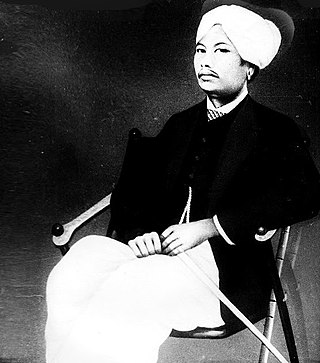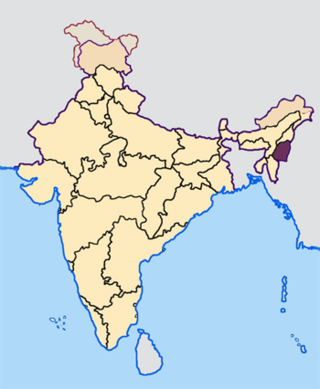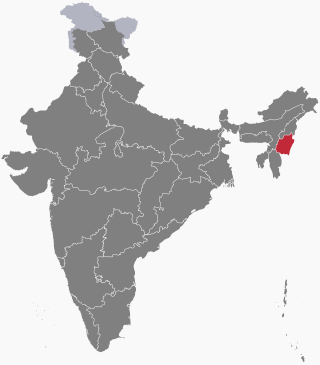
Manipur is a state in northeast India, with the city of Imphal as its capital. It is bounded by the Indian states of Nagaland to the north, Mizoram to the south and Assam to the west. It also borders two regions of Myanmar, Sagaing Region to the east and Chin State to the south. The state covers an area of 22,327 km2 (8,621 sq mi). The official and most widely spoken language is the Meitei language. Native to the Meitei people, it is also used as a lingua franca by smaller communities, who speak a variety of other Tibeto-Burman languages. Manipur has been at the crossroads of Asian economic and cultural exchange for more than 2,500 years. This exchange connects the Indian subcontinent and Central Asia to Southeast Asia, East Asia, Siberia, regions in the Arctic, Micronesia and Polynesia enabling migration of people, cultures and religions.

Tikendrajit Singh, also known as Koireng, was a crown prince of Kangleipak in present-day northeastern India, which was a protectorate of British Raj at that time. Tikendrajit was the commander of the Manipuri army and engineered a palace revolution that led to the events known as the Anglo-Manipur War of 1891 or the Manipur Expedition.

In the 2008 Imphal bombings, at least 17 people were killed and more than 30 were injured on 21 October 2008.

Kangleipak Communist Party is a Maoist militant group in Manipur, India. Named after Kangleipak, the ancient name of Manipur, it was initially led by the communist ideologues — Ibohanbi and Ibopishak. The Kangleipak Communist Party (KCP) had been engaged in an armed conflict separatist insurgency in Manipur against the government of India.
Rajkumar Jhalajit Singh was an Indian writer, historian, Gandhian and academic. He was known for his book, "A Short History of Manipur", which was banned from publishing or selling by his own family members, because the book misleads the readers that the Manipuris are the descendants of Arjuna of the Mahabharata.

Kaboklei is a 2009 Indian Meitei language film directed by Pilu Heigrujam and produced by Bandana Maisnam. It stars Manda Leima as the titular protagonist with Hamom Sadananda and Huirem Seema in the lead roles. The screenplay by Narendra Ningomba is based on Khaidem Pramodini's play Kabok Oikhrabi Kaboklei. The film was released at Hapta Kangjeibung, Imphal on 9 January 2009.

The following outline is provided as an overview of and topical guide to Manipur:
Leishemba Sanajaoba is the current member of the former royal family of the princely state of Manipur in India, and a politician belonging to the Bharatiya Janata Party from Manipur. In 2020, he was elected as the member of Rajya Sabha from Manipur. He is often addressed with the honorific "maharaja", which is not a statutory title. He continues to be the symbolic and spiritual head of ritualistic traditions of the erstwhile kingdom of Manipur.

Bobby Wahengbam is an Indian filmmaker, producer, writer and film critic known for his works in Manipuri films. He is the recipient of several accolades, including two National Film Awards. As a film critic, he contributed regularly for local and national newspapers for the last two decades, where some of his writings have been translated into other languages as well. Now, he regularly writes as a cinema critic for The People's Chronicle, a local English daily, every Sunday for the last four years.
Miss Kangleipak (Women's Best Physique) is an annual female bodybuilding competition of Kangleipak (Manipur). It co-exists with Miss Manipur, Femina Miss India Manipur and Meetei Chanu. Founded in the year 2012 by the "Manipur Amateur Body Builders Association" (MABBA), Miss Kangleipak is sponsored by the "Janaki Bar Bell Club" (JBC), Singjamei and "Lamyanba Meitei Gym", Sagolband Moirang Hanuba Leirak.

There are three notable museums inside the Kangla Fort in Imphal West district of Kangleipak, which are the Kangla Museum, the Archaeological Museum and the Memento Museum. Some people also count the Hijagang as a museum.

Events in the year 2022 in Manipur

The ancient legend of Kadeng Thangjahanba and Tonu Laijinglembi is an epic cycle of incarnations of Meitei mythology and folklore from Moirang kingdom of Ancient Kangleipak. It concerns the fateful love of Kadeng Thangjahanba, a skilled blacksmith, for the beautiful Tonu Laijinglembi.

The South East Asia Cultural Organisation (SEACO) is an international cultural organization that works for the development of the Meitei culture of Kangleipak (Meitei for 'Manipur'). It aims to preserve the unique history, culture, identity, and religion of Manipur. It also advocates to take "extra caution about the issue of preservation of the cultural identity of the Indigenous people in the wake of the present globalization".
The Hueiyen Lanpao, often abbreviated as HL, is an Indian Meitei language daily newspaper circulated mainly in the Northeast Indian state of Manipur. As Meitei language is written in both Meitei script and Bengali script, the Hueiyen Lanpao is printed in the editions of both the writing systems. It is the second most widely read daily newspaper in Meitei language, just after The Sangai Express, as per the reports of the Audit Bureau of Circulations (India), having average qualifying sales of more than 21,000-23,000 copies in between January-June to July-December 2019.
The Naharolgi Thoudang is an Indian Meitei language daily newspaper, circulated mainly in the Northeast Indian state of Manipur. Since Meitei language is written predominantly in both Meitei script and Bengali script, Naharolgi Thoudang is printed in different editions of the two writing systems.

The Sanaleibak, also known as the Sanaleibak Daily, is an Indian Meitei language daily newspaper, circulated mainly in the Northeast Indian state of Manipur.
The International Meeteis Forum is a Meitei ethnic advocacy group in the Indian state of Manipur. Its objectives are to assert Meitei indigeneity in Manipur, to unify Meiteis around the world, to campaign for the territorial integrity of the Manipur state and to block the influx of alleged foreigners. Founded in 2012 by a retired army officer R. K. Rajendro, it later teamed up with the Federation of Haomee with similar ideological motivations. Both the organisations generated free-flowing hate speech against the Kuki community of Manipur, labelling them as "immigrants" or "foreigners", which was instrumental in the generation of 2023 Manipur violence.












